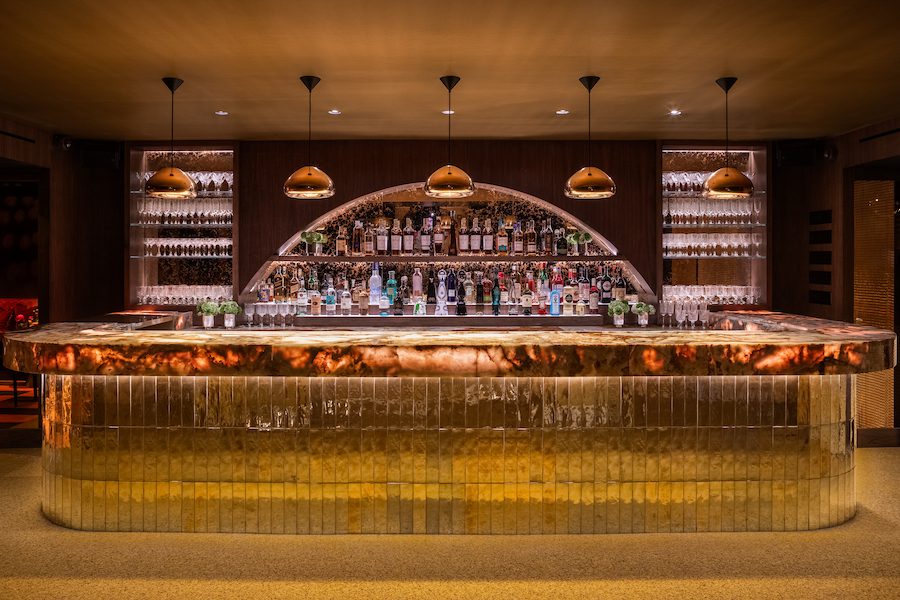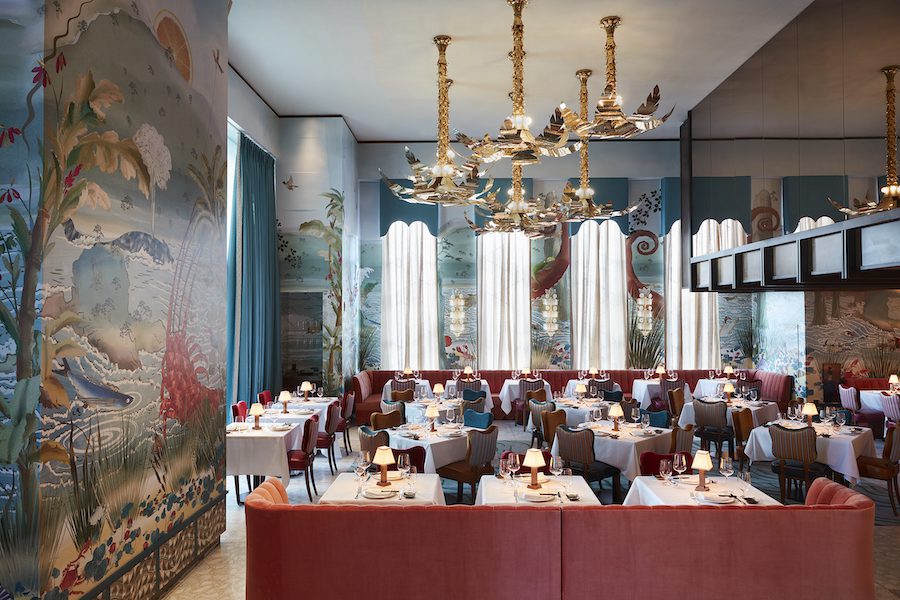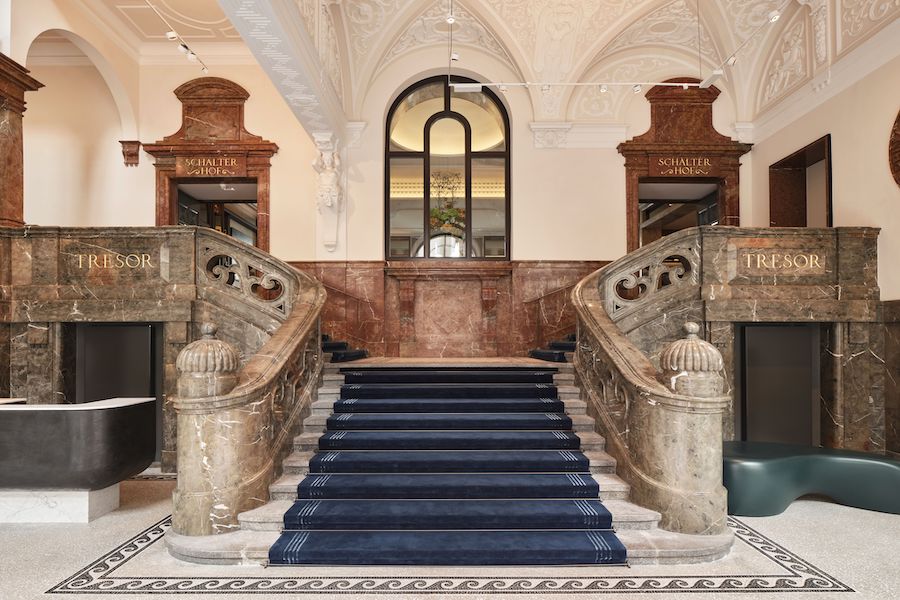
Five on Friday: May 17th, 2024
Saudi Arabia uses lethal force to clear land for the Neom project, inside a new wave of members clubs happening in New York, and hotels kick guest experiences up a notch. All that and more in this week’s Five on Friday.
Members clubs are everywhere—here’s an insider’s look

Japanese brasserie ZZ’s at the Ken Fulk-designed ZZ’s Club in New York; photo by Ngoc Minh Ngo
“This winter and spring, I visited all the clubs I could,” writes Emily Sundberg in GQ. “I learned of: swimming naked with the boss, priests shooting guns, $200,000 initiation fees, real Warhols, fake names, taxidermy, and all the spicy rigatoni money can buy. Private clubs are weird, it turns out.” Sundberg’s mission took her across New York, discovering that people are flocking to such clubs as they learn how to socialize again after the pandemic and—in a world where secrets don’t exist thanks to social media—seek the luxury of true privacy.
A new wave of members clubs is emerging across the city. There are members-only restaurant clubs like ZZ’s Club, which offers guaranteed tables at its Japanese dining concept ZZ’s and a Culinary Concierge, where its chefs dream up any dish to your liking with as little as two day’s notice. Then there are clubs like Tiro a Segno, open since 1888, with a full shooting range in the basement. Even nightclubs are making the transition to members clubs in the wake of rising demand from younger people who no longer see the appeal of cramming into a packed space with loud music. Sundberg breaks it all down, from Aman New York’s $200,000 initiation fee to the soon-to-come San Vicente Bungalows (replacing the West Village’s Jane Hotel) that is said to already have 10,000 people on the waitlist.
Lethal force is used to clear land for Neom eco-city project

The Line, a linear megacity slated for Saudi Arabia’s Neom development; rendering courtesy of Neom
Trouble continues to brew with Saudi Arabia’s $500 billion futuristic city Neom. As reported in last month’s Five on Friday, the project has been scaled down, without an approved budget for 2024 and a significantly reduced number of expected residents—from 1.5 million to less than 300,000. Now, the BBC has received intel from an ex-intelligence officer that Saudi authorities have permitted the use of lethal force to clear land for part of Neom’s construction. Rabih Alenezi, a dissident and former colonel in the Saudi Arabian police force, says he was ordered to evict villagers (mostly of the Huwaitat tribe, who have inhabited the region for generations) to make way for the Line, Neom’s flagship project that’s pitched as a car-free city, just 656 feet wide and 106 miles long. Alenezi dodged the mission on invented medical grounds, but it forged ahead, resulting in the murder of Abdul Rahim al-Huwaiti, who refused to allow a land registry committee to value his property.
Luxury hotels wow with next-level guest experiences

The view from a mountaintop helicopter adventure at Clayoquot Wilderness Lodge in Vancouver Island; photo courtesy of Clayoquot Wilderness Lodge
Hotels are feeling the pressure to offer more bespoke, one-of-a-kind guest experiences. Activities have always been a part of luxury hotel offerings, but now they’re pushing the boundaries even further, reports The New York Times. They’re going bigger and bolder, with brands like Aman offering classes with fashion photographer Mark de Paola, who help guests run a true-to-life shoot with hair, makeup, and styling. In France, the Carlton Cannes, a Regent hotel gives guests the chance to explore the perfume capital of Grasse in a vintage Citroën 2CV and create their own fragrance with some of the world’s most renowned perfumers. Activities in the great outdoors are also going beyond just fishing and hiking—guests at Clayoquot Wilderness Lodge in Vancouver Island, for instance, can be whisked away in a helicopter for a mountaintop adventure, complete with champagne and tremendous views. “If hotels want to stay competitive,” writes NYT’s Amy Thomas, “it seems that no experience is too ‘out there.’”
Gemini AI chatbot can create a custom vacation itinerary in seconds

Photo courtesy of Adobe Stock, fittingly generated by AI
Google’s Gemini, a ChatGPT competitor, is rolling out trip planning capabilities that can curate a custom itinerary in a matter of seconds, according to The Verge. The AI model will research publicly available information, as well as specific personal info—like flights and hotel bookings—to draw up a tailored schedule. Google says the ability to tap into personal details, like someone’s email inbox, is what differentiates the Gemini functionality from other chatbots. According to the company, an example prompt could read “My family and I are going to Miami for Labor Day. My son loves art and my husband really wants fresh seafood. Can you pull my flight and hotel info from Gmail and help me plan the weekend?” Trip planning capabilities will be available on Gemini Advanced in the coming months.
Adaptive reuse projects are on the rise

The original grand staircase at Rosewood Munich was preserved from the building’s past life as the Bavarian State Bank headquarters; photo courtesy of Rosewood Munich
RentCafe’s analysis of Yardi Matrix data shows that adaptive reuse of buildings is on the rise again, with hotel conversions accounting for more than one-third of such projects in the U.S. in 2023. The industry has gone through major transformations in the post-pandemic years, with many outdated hotels bearing the brunt of the reduced tourism and high debt service costs, causing owners to offload their underperforming properties. This has created an opportunity for developers to repurpose these properties into apartment buildings, especially in hotel-dense destinations like New York.
We’re now seeing the other side of this trend, where unused spaces are being repurposed into hotels, like a former banking headquarters transformed into the Rosewood Munich and the reimagining of a university dormitory into the Graduate Princeton. Read about some of these adaptive reuse projects (and more) in our April issue.
The post Five on Friday: May 17th, 2024 appeared first on Hospitality Design.
